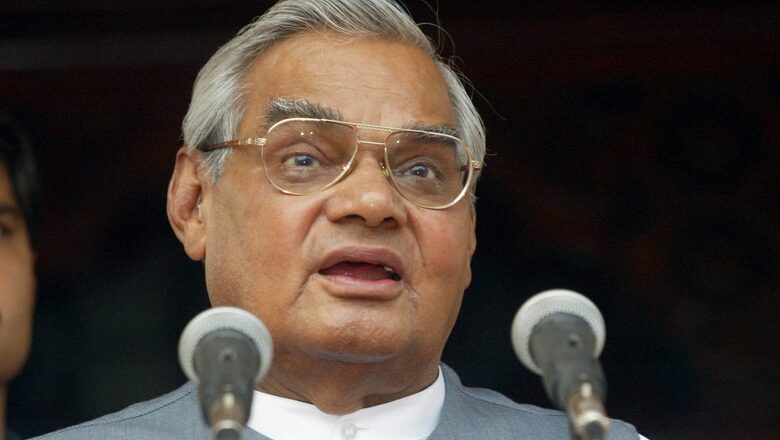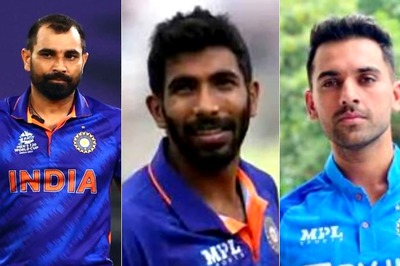
views
If biographies were just about research and style of writing, then Abhishek Choudhary would have got full marks for Vajpayee: The Ascent of the Hindu Right 1924-1977 (Picador India; Rs 899). Sadly, he has gone wrong in what truly is a fundamental prerequisite of a biography: The need to get the perspective right. He judges his subject, Atal Bihari Vajpayee in this case, as if he were one flawed character in the otherwise perfect and perfected Nehruvian world.
At the very beginning of the book, in fact, in the ‘Preface’ itself, Choudhary clarifies that this is not a tribute but an assessment — and that he is not “awestruck at the beauty of the tapestry”. It’s good not to be “awestruck” at the “beauty of the tapestry”, but it’s a greater sin to be obsessed with a few sporadic stains to discredit the entire fabric. The fact is when one analyses the era and its characters dispassionately, both Vajpayee and Nehru appear as liberal as they seem illiberal; they both display secular values while simultaneously exuding their non-secular, sectarian biases.
In this volume, covering the first five decades of Vajpayee’s life — from his birth in 1924 in Uttar Pradesh’s Bateshwar village to his becoming a minister in the Janata Party government in 1977 — the author seems possessed by the idea of a rigid Hindutva streak in Vajpayee, who is projected as a diehard swayamsevak fully conversant with and committed to the ideology. He writes, “The early Vajpayee was far more critical to the Sangh Parivar’s project of Hinduising India than is universally believed. As the founding editor of the mouthpieces Rashtradharma and Panchajanya during 1947-48, he was exactly the kind of RSS worker the government held responsible for creating the environment in which Gandhi was murdered.”
No doubt, Vajpayee was critical of Mahatma Gandhi’s dubious role in pandering to the “pan-Islamist ambitions of Indian Muslims”, referring to the Khilafat movement and the resultant communal disturbances across the country, especially in the Malabar region. He also believed that the Congress leadership led by the Mahatma failed miserably in containing the Partition woes. But, to accuse him of playing a pivotal role in the creation of an anti-Gandhi milieu that led to his assassination is not a correct assessment. Being critical to Gandhi doesn’t make him complicit in fanning the Mahatma’s murder.
Vajpayee shared this outlook with many of his contemporaries, especially in the wake of the idea of Pakistan gaining unprecedented support among the Muslim community — nine out of 10 Muslims, for instance, voted for the creation of Pakistan, and once formed most of them decided to stay back! In fact, Dr BR Ambdekar took an ever more stringent stand on the issue, going to the extent of seeking the transfer of population. Is he even blamed for the Mahatma’s assassination?
While Choudhary never fails to put Vajpayee and the RSS in dock for every problem ailing post-Independence India, he doesn’t use the same yardstick for the Nehru-Gandhis. On the Mahatma’s assassination, for instance, one would have expected the author to explore why the State administration failed to provide him security even when threats on his life were imminent. How could he be assassinated so easily just 10 days after a failed bomb attack on the same venue — and that too by the same set of people? With a large section of the public being angry with the Mahatma, it’s mindboggling why the police failed to beef up Gandhi’s security. As per British historian Robert Payne (The Life and Death of Mahatma Gandhi), on the day Gandhi was killed, only one assistant sub-inspector, two head constables, and 16 foot constables were assigned to keep the Mahatma safe. When Nathuram Godse decided to pump bullets into Gandhi’s heart, he was nothing but a sitting duck at the Birla House.
Even the author’s democratic, secular yardsticks are different for Vajpayee and, say, Nehru. The first Prime Minister, for instance, wanted the ban on RSS to continue, even when there was no concrete evidence implicating it — just because it would not be appreciated in the West, as Nehru wrote in a letter to Sardar Patel. Now, that’s not the way a nation proud of its democracy and rule of law should work. But Choudhary doesn’t seem to care, as he, quite approvingly, wonders in the book how things could have been different had Nehru held the direct command of the police!
Interestingly, while Choudhary accuses Vajpayee of doublespeak and being a moderate mask for the Sangh’s alleged sectarianism, Nehru too manifested a similar “split personality”. Vajpayee told Nehru, “You have a split personality; you are both Churchill and Chamberlain.” That day, Nehru seemed to exhibit a Chamberlain-esque characteristic: He didn’t get offended; instead, he hoped that Vajpayee would “one day become the country’s prime minister” and instructed one of his secretaries to “take good care of this young man”.
But then, there were days when he showcased Churchillian personality. Sita Ram Goel, in Why I Became a Hindu, accused Nehru of being ruthless, almost tyrant-like with those he thought he could get away with, while at the same time sustaining “a deep-seated sense of inferiority vis-à-vis Islam, Christianity, and the modern West”. He recalled attending a public meeting in Chandni Chowk in 1934-35, where Nehru “planted a slap smack” on the face of a junior Congress leader just because the mike wasn’t working. The face of the slapped Congress leader was “bathed in smiles as if he had won some coveted prize”, Goel recalled.
Goel shared another anecdote wherein one of his journalist friends from the US, during his Delhi visit in 1947-48, saw Nehru, accompanied by one of his sisters, hurriedly coming out of his residence and slapping a sadhu. “His sister did the same!” These sadhus were seeking a ban on cow slaughter “now that the beef-eating British had departed”. The US journalist summed up the incident by saying: “I don’t know the norm in your country. In my country, if the President so much as shouts at a citizen, he will have to go. We take it from no bast**d, no matter how big he happens to be.”
Nehru showed the same dubious libertarian, democratic credentials while getting the First Amendment passed, thus putting “reasonable restrictions” on freedom of expression. He, then at least, believed that free press was “poisoning the minds of the younger generation, degrading their mental integrity and moral standards”. Similarly, the democratic values went missing in Nehru when he summoned the police to “crush” an RSS-Jan Sangh satyagraha in the capital; he even threatened to “call the Army out”. His secular double standard was evident when he zealously pushed the Hindu Code Bill but was more than happy to let Muslims remain in their personal law ghettos.
And if one thought the ban culture came to India with The Satanic Verses, think again! Nehru had the dubious distinction of banning almost two dozen books and films during his prime ministerial stint. The novel, Nine Hours to Rama, written by Stanley Wolpert, for instance, was banned in 1962 for highlighting the negligence on the part of the Indian government in saving Gandhi’s life. Worse, Alexander Campbell’s The Heart of India (1959) was banned because it presented a humorous account of India’s bureaucracy and economic policymaking. And, if one thought banning books, films was the worst that could have happened, noted lyricist Majrooh Sultanpuri, in 1952, found himself in jail for two years just for calling Nehru a lackey of Hitler and a slave to the Commonwealth in one of his poems!
Choudhary’s ideological partisanship is evident not just with Vajpayee; he is equally unsparing in his criticism of Sardar Patel for his “harsh” words on “many Muslims who had chosen to live in India”, besides trying to accommodate the RSS and the Mahasabha “to join the Congress”. The author has abysmally failed to correctly assess Patel, deliberately or otherwise, at a time when India was precariously placed with not just the proponents of Pakistan but also the advocates of the Adhikari Thesis working overtime to balkanise the country. Patel, for all his ideological differences with the Sangh, saw a partner in the India unity project.
Coming to Vajpayee, what Choudhary sees as doublespeak could also be a case of gradual evolution of ideas, worldviews in the late Prime Minister. But the author, like many others belonging to the ecosystem he hails from, remains unsparing and unforgiving to those on the other side of the ideological divide. It is this “once a pariah, always a pariah” mentality that makes the author go all out to “bust” the image of “Nehru-worshipping” Vajpayee. It’s a premature endeavour, though. Vajpayee did criticise Nehru, scathingly many a time, whether on the Hindu Code Bill or the China issue or even the handling of Partition and the ban of RSS. But that didn’t stop him from being a Nehru admirer.
When Nehru died in 1964, Vajpayee paid a deeply emotional tribute. “A dream has been shattered, a song silenced, a flame has vanished in the infinite. It was the dream of a world without fear and without hunger, it was the song of an epic that had the echo of the Gita and the fragrance of the rose… The common man has lost the light in his eyes. In the Ramayana, Maharishi Valmiki has said of Lord Rama that he brought the impossible together. In Panditji’s life we see a glimpse of what the great poet said…”
Only an ardent Nehru admirer could have uttered those words. But then, in the Left-‘liberal’ ecosystem, there’s no redemption for an ideological pariah. It’s a lesson for Hindutva leaders and intellectuals who tend to go weak-kneed seeking Left-‘liberal’ legitimacy. They may get tactical reprieve, as Vajpayee got vis-à-vis LK Advani in the past — and is now invoked fondly in the Lutyens’ world when Narendra Modi is the target. But in the ultimate analysis, there’s no liberal absolution for a Hindutva leader. Not at least till the idea of liberalism continues to be defined through Nehruvian phraseology and parameters.
In the end, however, the author, Abhishek Choudhary, should be thanked for bringing Vajpayee back to where he truly belongs — the Hindutva ecosystem. There has been a tendency, of late, to project him as a Nehruvian liberal. Vajpayee admired Nehru, no doubt; but he wasn’t a Nehruvian. He was a Hindutva leader who lived and loved a liberal life. And Vajpayee showed, through his own life, that Hindutva wasn’t an antithesis to the idea of democracy, secularism and liberalism.
Views expressed in the above piece are personal and solely that of the author. They do not necessarily reflect News18’s views.

















Comments
0 comment